337 Search Results for communication boards
November 10, 2016
by Carole Zangari -
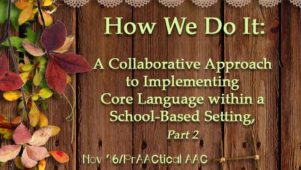
We’re excited to welcome back SLPs Lori Sanzeri and Chelsea Collins, creators of Core City, to tell us more about implementing this approach. They both work for the NYC Department of Education and created Core City to promote classroom-wide support of AAC. Last month, they introduced us to Core City. In this post, they share some of the ways that they get everyone involved in using and teaching AAC. STAFF TRAINING The most difficult part of training all staff is finding the time. We are fortunate to have a supportive administration that understands the importance of communication and works to find time to allow us to meet for professional development. If you are not afforded this time, our experience has shown us that the most successful staff training occurs by us modeling our strategies while we are working with the children in the classroom. We encourage the following strategies to... [Read More...]
October 3, 2016
by Carole Zangari -
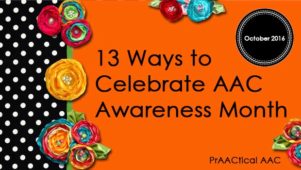
Need some ideas for celebrating AAC Awareness Month? Here are a few to get you started. Participate on the #USSAAC Twitterchat on 10/13 at 7:00 pm EDT (UTC−04:00). New to Twitterchats? You can learn more here. The wonderful Chris Bugaj will be moderating. Subscribe to a blog with an AAC content, such as Uncommon Sense, Jane Farrall Consulting, AAC Girls, or Superpower Speech Follow a new AAC topical Pinterest board from Lauren Enders and others: AAC and AT, AT/AAC/Adapt/Modify/Accessibility/Accommodations, AT for Communication, SLP AAC, & AugComm, AAC by Constantly Speaking, Communication-AAC Print, hang, or give someone an AAC awareness image, 10 Commandments of AAC Devices, or 5 Tips for Communicating with Nonverbal Student Register for a free AAC professional development webinar from Ablenet University Print out an AAC Poster, like Lauren Enders’ AAC Boot Camp-Getting AAC Users to Communicate or Kate Ahern’s The Periodic Table of AAC, Explore an AAC app or SGD that is new to you Print out song visual... [Read More...]
September 26, 2016
by Carole Zangari -
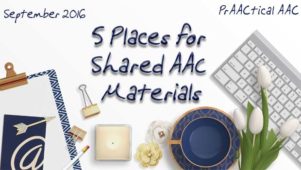
One of the most incredible things about the families and professionals who work in the field of AAC is their willingness to share the materials they create. In this post, we link to some of those wonderful sites where you can go to peruse and use AAC materials for communication, therapy, and classroom instruction. Kudos to all the companies and individuals who work so hard to make this collegiality possible! Speaking of Speech Materials Exchange (AAC) Lesson Pix Sharing Center Boardmaker Online CoughDrop Publicly-shared Boards Smarty Symbols Activity Library We’re just getting started and ready to expand this list in future posts. Do you have favorite places to go for sharing AAC materials? Let us know so we can continue to develop this list.
August 8, 2016
by Carole Zangari -
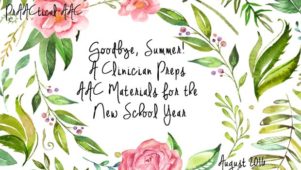
Here in the US, many SLPs who work in educational settings are getting ready to head back to school. In today’s post, we hear from Elizabeth Levy, an SLP at Wasatch County School District in Utah. Elizabeth, who earned her Bachelors and Master’s degrees from Towson University in Maryland, worked in early intervention for several years before joining the team at Midway Elementary two years ago. She has always had a passion for working with children who are nonverbal and require AAC, and is a member of ASHA’s Special Interest Group 12 (AAC). She also serves as part of her district’s AT team. In this post, Elizabeth shares a little bit about how she used the summer to gear up for an initiative to provide additional AAC support for students with significant learning challenges. ::::::::::::::::::::::::::::::::::::::::::::::::::::::::::::::::::::::::::::::::::::: This year, with a new team, I have a great opportunity to go big and... [Read More...]
May 5, 2016
by Carole Zangari -
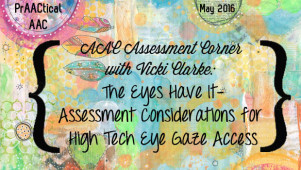
AAC assessment is an area that most professionals struggle with for one reason or another. I am so grateful to Vicki Clarke for returning to share her thoughts on the prAACticalities of conducting these evaluations. If you are looking for tips on assessing someone who needs high tech eye gaze AAC, this post is for you. For other posts authored by Vicki, click here. ::::::::::::::::::::::::::::::::::::::::::::::::::::::::::: The Eyes Have It: Assessment Considerations for High Tech Eye Gaze Access Eye gaze control for AAC device access is a hallmark technological achievement in the world of speech generating devices. For people with significant motor challenges we are no longer limited to scanning as our one choice for AAC access. AAC Specialists have been using light tech eye gaze boards and PVC pipe frames with these friends for years, but now we are able to offer voice output. Eye gaze is for a much... [Read More...]
April 4, 2016
by Carole Zangari -
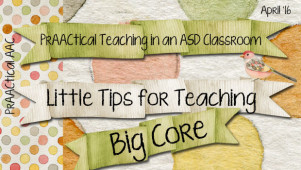
Special educators Lauren Pawlowski and Amy Devin are back with tips for making AAC work in the classroom. In their first post, they talked about using a large communication board that is rich in core vocabulary for aided language input and AAC instruction. Today, they share some of the things they’ve learned to make this more manageable in a busy classroom. Enjoy! ::::::::::::::::::::::::::::::::::::::::::::::::::::::::::::::::::::::::::::::::::::::::: We hope that many of you were able to make your Big Core boards for group instruction. Now what?? Using Big Core can take a while to get used to. Even after using it for several years, sometimes we still struggle with finding the words quickly. Don’t worry about this because our students can’t always find words quickly and it is good for them to see that everyone struggles with language at times. It can also be empowering to them if you ask for their help! The... [Read More...]
March 17, 2016
by Carole Zangari -
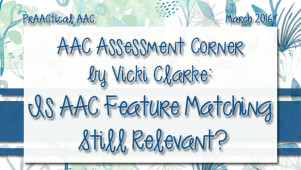
Today, we welcome back Vicki Clarke, a regular contributor to PrAACtical AAC, with another edition of AAC Assessment Corner. In this post, Vicki shares her thoughts on feature matching for AAC device selection. ::::::::::::::::::::::::::::::::::::::::::::::::::::::::::::::::::::::::::::::::::::::::::::::::::::::::::::::::::::: Feature matching has been the gold standard for AAC evaluation for the last 20 years. It is research based and clinically proven as the best technique for selecting an AAC solution for an individual. The tide of real-life practice, however, is turning and there has been increasing discussion at conferences, in social media and blogs questioning why we continue to use feature matching to place AAC systems in the hands of students. In a recent assistive technology on-line chat, a noted AT specialist remarked: “I wonder if at a district level it might not be better to have a go-to AAC system everyone tries first. If that doesn’t work then adjust.” Does this mean that we throw... [Read More...]
March 14, 2016
by Carole Zangari -
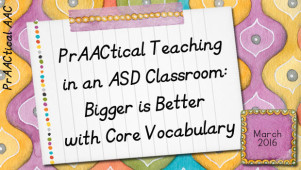
Today we launch a new series, PrAACtical Teaching in an ASD Classroom, which will address the nuts and bolts of infusing AAC throughout the school day. I couldn’t be more delighted to introduce you to two talented special educators, Amy Devin and Lauren Pawlowski, who work in the public school system in Michigan. Amy and Lauren began teaching in self‐contained ASD elementary classrooms in 2009 and taught in resource rooms prior to that. When they first started with their own classrooms, there was not much talk about core language, let alone how to implement it on a classroom-wide basis. They started with a 32-cell core board on a digitized speech device and now use a 64-location core vocabulary on a manual communication board, large instructional core boards, and individual AAC devices. They are passionate literacy teachers and believe that every child can read, write and communicate. Enjoy their post and... [Read More...]
January 18, 2016
by Carole Zangari -
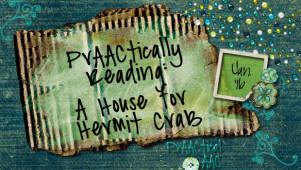
Storybook reading is rich with potential for building AAC, language, and literacy skills. An added bonus: It’s an activity that educators, therapists, and families can all use and enjoy. In this post, we explore ways to use A House for Hermit Crab, by Eric Carle, for AAC and language learning. Key Instructional Strategies Having an engaging book gives us a good start on the lesson, but the learning comes from the interaction. Shared reading can be done in therapy one-on-one or as a group in class. Either way, the adult leading the activity will need to be well-versed in instructional strategies that facilitate AAC learning. These include: Aided language input RAAP Feedback Goal Areas: Language and Communication There are lots and lots of ways to use this book for literacy learning, but in this post we’ll focus more on the development of communication and language skills. Here are some goal... [Read More...]
October 5, 2015
by Carole Zangari -
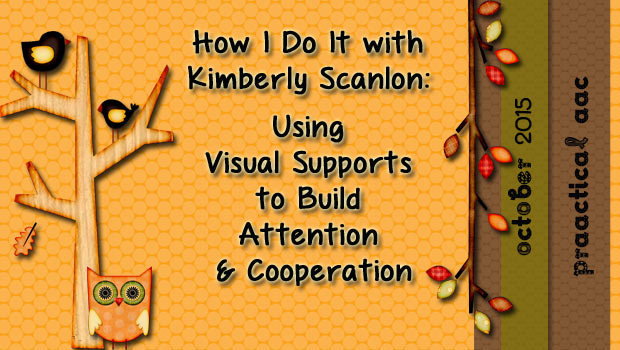
Having solid goals and fun activities is one thing, but being able to connect the two and teach communication and language takes skill. We have the best outcomes when the interventionist knows a variety of strategies that can support the learning outcomes. We’ve written about implementing countdown boards and other visual supports to build attention in the past, and have been gratified to hear from many of you who utilize those strategies. In today’s post, SLP Kimberly Scanlon, owner of Scanlon Speech Therapy, discusses how she implements this strategy and shares her own clever variation. You can download it at the end of the post. :::::::::::::::::::::::::::::::::::::::::::::::::::::::::::::::::: You plan the session. In fact, you over-plan and over prepare. You carefully select materials ensuring they are appropriate, engaging, and motivating for the client. Each activity will be short. Short is key as this student grows restless and losses interest rather quickly. You remove... [Read More...]









